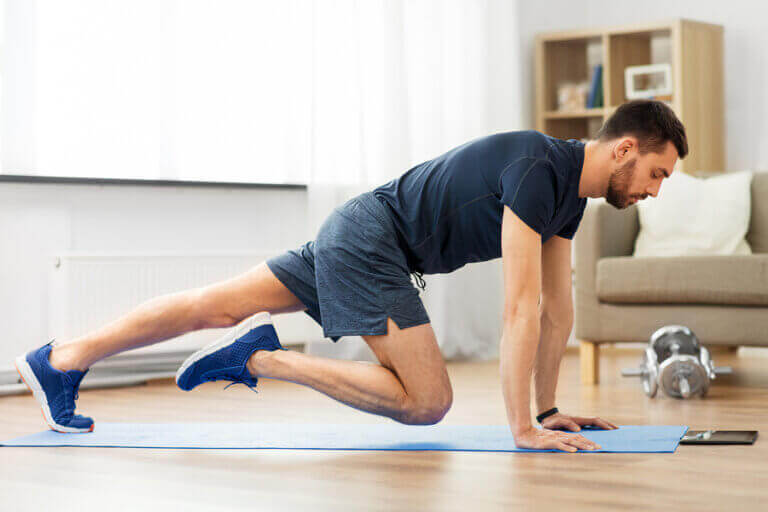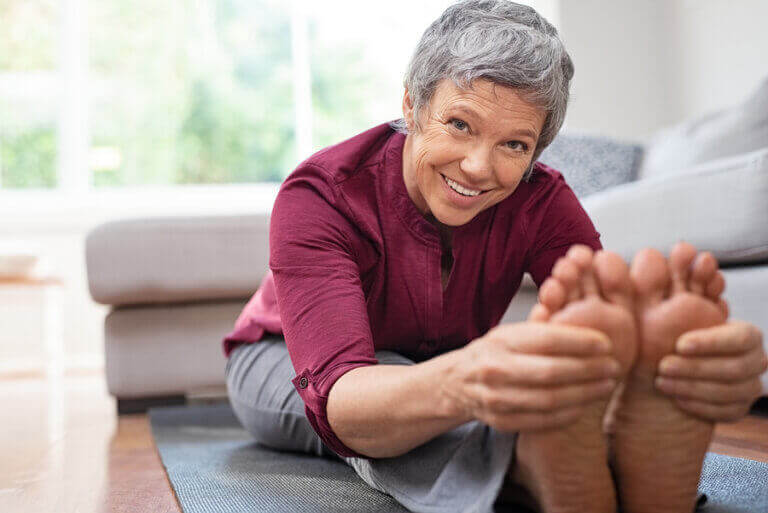Does Exercise During Quarantine Reduce Stress?

One of the most popular internet searches these days is how to reduce the stress caused by the quarantine situation. Many people start cooking, learning a new skill, or playing an instrument. However, there’s one option to reduce stress during quarantine that stands out above the rest: exercise.
During this time, we’re discovering a lot of ideas to exercise at home as if we were in the gym. This is because physical exercise isn’t only a form of entertainment and distraction from everything that’s going on, but it also helps to reduce stress and anxiety about being locked up.
There’s a lot of evidence that points to physical exercise being an effective way to reduce stress. The explanations for this phenomenon cover biological, psychological, and social aspects. In this article, you’ll discover the reasons why exercise can help you to be better in many ways during the quarantine.
Changes in the body after exercise
After exercising, the body goes through changes that positively affect our mood. The brain releases molecules such as dopamine, endorphins, and serotonin. These three molecules cause feelings of well-being and relaxation, which can last for several hours after we’re done with the workout.
Furthermore, there’s evidence that physical activity maintains the necessary supply of nutrients to the brain, and optimizes cognitive processes (attention, memory, and perception). This is why people feel more active and awake after exercising.

The stress reduction changes that occur in our bodies not only happen in the brain. Some exercises such as yoga and Pilates focus on breathing control, an action closely related to anxiety. Therefore, if you modify the way in which you breathe, making it slower and deeper, you can reduce anxiety and emotional distress.
The psychological reasons why exercise can help reduce stress during the quarantine
The reasons why physical exercise helps to combat this problem go beyond biological explanations. There are psychological reasons why exercise is beneficial for your mood:
- Establishes a routine. Setting apart an hour a day to exercise is a routine. Routines reduce uncertainty and give us a sense of control over our day. It also helps us to avoid wasting time and spending too much time doing nothing.
- It helps you fall asleep. Physical exercise can help you rest better. Not only because your body releases relaxation-inducing molecules after exercise, but also because all that energy expenditure will make you feel the need to rest at night.
- Increase the feeling of achievement. Making small progress and seeing how your physical appearance improves, generates a feeling of well-being that is incompatible with stress. You don’t have to go to a gym to exercise properly; with creativity and everyday objects, you can carry out a demanding exercise routine.
- Free the mind from negative thoughts. While doing physical exercise, our mind can focus on the movements and not on negative thoughts. In most cases, stress comes from thoughts about the future and uncertainty rather than from the situation itself. Therefore, if you’re able to avoid these thoughts, your mood will be more positive.

- It’s a way of connecting with others. There are many fitness professionals who offer distance classes and workshops these days. Taking advantage of that resource to exercise can help reduce the feeling of isolation and make us feel part of an online community.
Reduce stress with exercise during the quarantine
Exercise is an ideal activity to reduce stress at any time. During and after physical activity, the body goes through changes that improve your mood.
Furthermore, physical exercise has psychological effects that positively influence your well-being. Caring for your mind during quarantine is just as important as caring for your body.
During this period, it’s important to take an hour a day to exercise. There are many possibilities and combinations you can follow. From calmer exercises such as yoga and Pilates that help to slow down our breathing, to more intense ones that require a lot of energy and help us to fall asleep.
One of the most popular internet searches these days is how to reduce the stress caused by the quarantine situation. Many people start cooking, learning a new skill, or playing an instrument. However, there’s one option to reduce stress during quarantine that stands out above the rest: exercise.
During this time, we’re discovering a lot of ideas to exercise at home as if we were in the gym. This is because physical exercise isn’t only a form of entertainment and distraction from everything that’s going on, but it also helps to reduce stress and anxiety about being locked up.
There’s a lot of evidence that points to physical exercise being an effective way to reduce stress. The explanations for this phenomenon cover biological, psychological, and social aspects. In this article, you’ll discover the reasons why exercise can help you to be better in many ways during the quarantine.
Changes in the body after exercise
After exercising, the body goes through changes that positively affect our mood. The brain releases molecules such as dopamine, endorphins, and serotonin. These three molecules cause feelings of well-being and relaxation, which can last for several hours after we’re done with the workout.
Furthermore, there’s evidence that physical activity maintains the necessary supply of nutrients to the brain, and optimizes cognitive processes (attention, memory, and perception). This is why people feel more active and awake after exercising.

The stress reduction changes that occur in our bodies not only happen in the brain. Some exercises such as yoga and Pilates focus on breathing control, an action closely related to anxiety. Therefore, if you modify the way in which you breathe, making it slower and deeper, you can reduce anxiety and emotional distress.
The psychological reasons why exercise can help reduce stress during the quarantine
The reasons why physical exercise helps to combat this problem go beyond biological explanations. There are psychological reasons why exercise is beneficial for your mood:
- Establishes a routine. Setting apart an hour a day to exercise is a routine. Routines reduce uncertainty and give us a sense of control over our day. It also helps us to avoid wasting time and spending too much time doing nothing.
- It helps you fall asleep. Physical exercise can help you rest better. Not only because your body releases relaxation-inducing molecules after exercise, but also because all that energy expenditure will make you feel the need to rest at night.
- Increase the feeling of achievement. Making small progress and seeing how your physical appearance improves, generates a feeling of well-being that is incompatible with stress. You don’t have to go to a gym to exercise properly; with creativity and everyday objects, you can carry out a demanding exercise routine.
- Free the mind from negative thoughts. While doing physical exercise, our mind can focus on the movements and not on negative thoughts. In most cases, stress comes from thoughts about the future and uncertainty rather than from the situation itself. Therefore, if you’re able to avoid these thoughts, your mood will be more positive.

- It’s a way of connecting with others. There are many fitness professionals who offer distance classes and workshops these days. Taking advantage of that resource to exercise can help reduce the feeling of isolation and make us feel part of an online community.
Reduce stress with exercise during the quarantine
Exercise is an ideal activity to reduce stress at any time. During and after physical activity, the body goes through changes that improve your mood.
Furthermore, physical exercise has psychological effects that positively influence your well-being. Caring for your mind during quarantine is just as important as caring for your body.
During this period, it’s important to take an hour a day to exercise. There are many possibilities and combinations you can follow. From calmer exercises such as yoga and Pilates that help to slow down our breathing, to more intense ones that require a lot of energy and help us to fall asleep.
All cited sources were thoroughly reviewed by our team to ensure their quality, reliability, currency, and validity. The bibliography of this article was considered reliable and of academic or scientific accuracy.
- Cornejo Callejo, P. (2017). El uso del ejercicio físico como intervención enfermera en pacientes con depresión leve y moderada.
-
Herrero, L. B., y Ferradaz, M. A. L. (2011). Aportes del ejercicio físico a la actividad cerebral. Lecturas: Educación física y deportes, (160), 1-7.
This text is provided for informational purposes only and does not replace consultation with a professional. If in doubt, consult your specialist.








